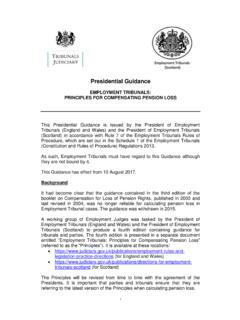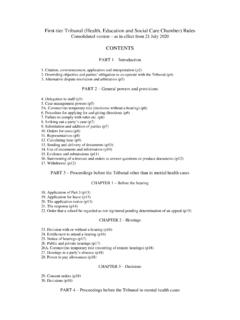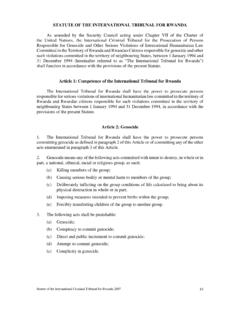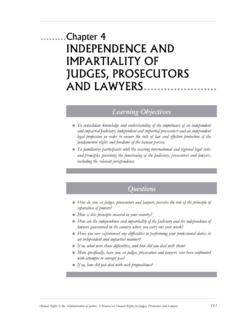Transcription of First-tier Tribunal (Tax Chamber) Rules CONTENTS
1 First-tier Tribunal (Tax Chamber) Rules Consolidated version as in effect from 21 July 2020. CONTENTS . PART 1 Introduction 1. Citation, commencement, application and interpretation (p2). 2. Overriding objective and parties' obligation to co-operate with the Tribunal (p3). 3. Alternative dispute resolution and arbitration (p4). PART 2 General powers and provisions 4. Delegation to staff (p4). 5. Case management powers (p4). 5A. Coronavirus temporary rule (decisions without a hearing) (p5). 6. Procedure for applying for and giving directions (p5). 7. Failure to comply with Rules etc. (p5). 8. Striking out a party's case (p6). 9. Substitution and addition of parties (p6). 10. Orders for costs (p7). 11. Representatives (p8). 12. Calculating time (p8). 13. Sending and delivery of documents (p9).
2 14. Use of documents and information (p9). 15. Evidence and submissions (p9). 16. Summoning or citation of witnesses and orders to answer questions or produce documents (p10). 17. Withdrawal (p10). 18. Lead cases (p11). PART 3 Procedure before the Tribunal CHAPTER 1 Starting proceedings and allocation of cases to categories 19. Proceedings without notice to a respondent (p11). 20. Starting appeal proceedings (p11). 21. Starting proceedings by originating application or reference (p12). 22. Hardship applications (p12). 23. Allocation of cases to categories (p13). CHAPTER 2 Procedure after allocation of cases to categories 24. Basic cases (p13). 25. Respondent's statement of case (p14). 26. Further steps in a Default Paper case (p14). 27. Further steps in a Standard or Complex case (p14).
3 28. Transfer of Complex cases to the Upper Tribunal (p15). CHAPTER 3 Hearings 29. Determination with or without a hearing (p15). 30. Entitlement to attend a hearing (p15). 31. Notice of hearings (p15). 32. Public and private hearings (p15). 32A. Coronavirus temporary rule (recording of remote hearings) (p16). 33. Hearings in a party's absence (p17). CHAPTER 4 Decisions 34. Consent orders (p17). 35. Notice of decisions and reasons (p17). PART 4 Correcting, setting aside, reviewing and appealing Tribunal decisions 36. Interpretation (p17). 37. Clerical mistakes and accidental slips or omissions (p18). 38. Setting aside a decision which disposes of proceedings (p18). 39. Application for permission to appeal (p18). 40. Tribunal 's consideration of application for permission to appeal (p19).
4 41. Review of a decision (p19). 42. Power to treat an application as a different type of application (p19). PART 1. Introduction Citation, commencement, application and interpretation 1. (1) These Rules may be cited as the Tribunal Procedure ( First-tier Tribunal ) (Tax Chamber). Rules 2009 and come into force on 1st April 2009. (2) These Rules apply to proceedings before the Tax Chamber of the First-tier Tribunal . (3) In these Rules . the 2007 Act means the tribunals , Courts and Enforcement Act 2007;. appellant means . (a) the person who starts proceedings (whether by bringing or notifying an appeal, by making an originating application, by a reference, or otherwise);. (b) in proceedings started jointly by more than one person, such persons acting jointly or each such person, as the context requires.
5 (c) a person substituted as an appellant under rule 9 (substitution and addition of parties);. Basic case means a case allocated to the Basic category under rule 23 (allocation of cases to categories);. CAA case means an application under section 563 of the Capital Allowances Act 2001;. Complex case means a case allocated to the Complex category under rule 23 (allocation of cases to categories);. Compliance Officer means the Compliance Officer for IPSA;. Default Paper case means a case allocated to the Default Paper category under rule 23. (allocation of cases to categories);. devolved Welsh case means an appeal, referral or application under . (a) a Measure or Act of the National Assembly for Wales; or (b) an instrument made under a Measure or Act of the National Assembly for Wales.
6 Document means anything in which information is recorded in any form, and an obligation under these Rules to provide or allow access to a document or a copy of a document for any purpose means, unless the Tribunal directs otherwise, an obligation to provide or allow access to such document or copy in a legible form or in a form which can be readily made into a legible form;. 2. financial restrictions civil penalty case means an appeal under paragraph 26(3) or 28(1) of Schedule 7 to the Counter-Terrorism Act 2008;. hearing means an oral hearing and includes a hearing conducted in whole or in part by video link, telephone or other means of instantaneous two-way electronic communication;. HMRC means Her Majesty's Revenue and Customs but also includes . (a) the National Crime Agency when carrying out functions under section 317 of the Proceeds of Crime Act 2002; and (b) the Director of Border Revenue when carrying out functions under section 7 of the Borders, Citizenship and Immigration Act 2009.
7 IPSA means the Independent Parliamentary Standards Authority;. MP expenses case means an appeal under the Parliamentary Standards Act 2009;. party means a person who is (or was at the time that the Tribunal disposed of the proceedings) an appellant or respondent in proceedings before the Tribunal ;. practice direction means a direction given under section 23 of the 2007 Act;. respondent means . (a) in a case other than an MP expenses case or a devolved Welsh case . (i) HMRC, where HMRC is not an appellant;. (ii) in proceedings brought by HMRC alone, a person against whom the proceedings are brought or to whom the proceedings relate;. (b) in a MP expenses case, the Compliance Officer;. (ba) in a devolved Welsh case . (i) WRA, where WRA is not an appellant;. (ii) in proceedings brought by WRA alone, a person against whom the proceedings are brought or to whom the proceedings relate; and (c) in any case, a person substituted or added as a respondent under rule 9 (substitution and addition of parties).
8 Standard case means a case allocated to the Standard category under rule 23 (allocation of cases to categories);. Tribunal means the First-tier Tribunal ;. WRA means the Welsh Revenue Authority. Overriding objective and parties' obligation to co-operate with the Tribunal 2. (1) The overriding objective of these Rules is to enable the Tribunal to deal with cases fairly and justly. (2) Dealing with a case fairly and justly includes . (a) dealing with the case in ways which are proportionate to the importance of the case, the complexity of the issues, the anticipated costs and the resources of the parties;. (b) avoiding unnecessary formality and seeking flexibility in the proceedings;. (c) ensuring, so far as practicable, that the parties are able to participate fully in the proceedings.
9 (d) using any special expertise of the Tribunal effectively; and (e) avoiding delay, so far as compatible with proper consideration of the issues. (3) The Tribunal must seek to give effect to the overriding objective when it . (a) exercises any power under these Rules ; or (b) interprets any rule or practice direction. (4) Parties must . 3. (a) help the Tribunal to further the overriding objective; and (b) co-operate with the Tribunal generally. Alternative dispute resolution and arbitration 3. (1) The Tribunal should seek, where appropriate . (a) to bring to the attention of the parties the availability of any appropriate alternative procedure for the resolution of the dispute; and (b) if the parties wish, and provided that it is compatible with the overriding objective, to facilitate the use of the procedure.
10 (2) Part 1 of the Arbitration Act 1996 does not apply to proceedings before the Tribunal . PART 2. General powers and provisions Delegation to staff 4. (1) Staff appointed under section 40(1) of the 2007 Act ( Tribunal staff and services) or section 2(1) of the Courts Act 2003 (court officers, staff and services) may, if authorised by the Senior President of tribunals under paragraph 3(3) of Schedule 5 to the 2007 Act, carry out functions of a judicial nature permitted or required to be done by the Tribunal . (3) Within 14 days after the date that the Tribunal sends notice of a decision made by a member of staff under paragraph (1) to a party, that party may make a written application to the Tribunal for that decision to be considered afresh by a judge. Case management powers 5.















